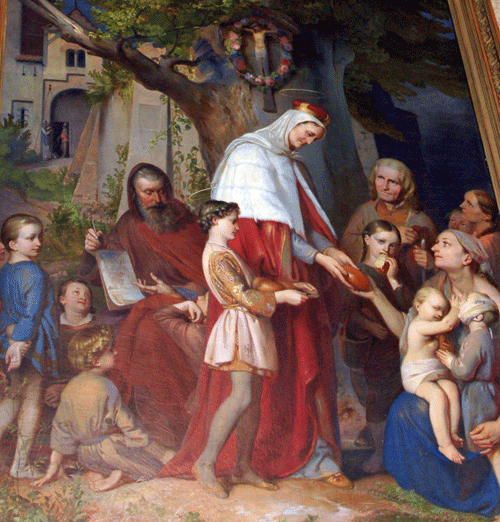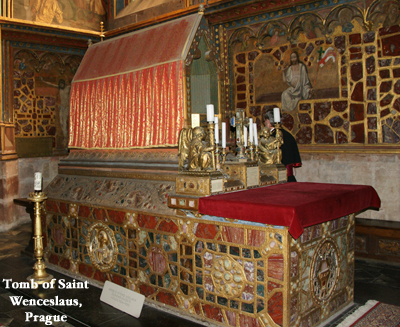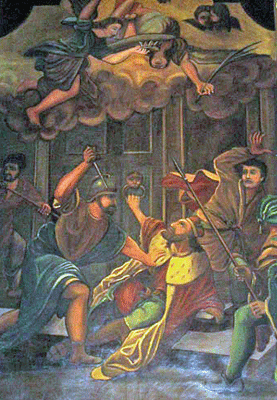

Saint Ludmilla with a young Saint Wenceslaus.
Saint Wenceslaus recalls to us the entrance into the Church of a warlike nation, the Czechs, the most indomitable of the Slavonic tribes, which had penetrated into the very midst of Germany. It is well known with what bitterness and active energy this nation has upheld its social claims, as though its struggle for existence in the early days of its history had made it proof against every trial. The faith of its apostles and martyrs, the Roman Catholic Faith, has been the safeguard, as it has been the bond of union, of the countries subject to the crown of Saint Wenceslaus. Heresy, whether it be the native Hussite, or the "reform" imported from Germany, could not but lead the people to eternal ruin. Saint Wenceslaus the martyr, grandson of the holy martyr Saint Ludmilla, and great-uncle of the monk-Bishop and martyr Saint Adalbert, has always invited his faithful subjects to follow him on the only path where they may find honor and security, both for this world and for the next.
Let us now read the lessons of Holy Church. The conversion of Bohemia dates from the latter part of the 9th century, when Saint Methodius baptized Saint Ludmilla and her husband Borziwoi—the first Christian duke of the line of Premislaus. The pagan reaction, during which Saint Wenceslaus gained the palm of martyrdom, was shortlived.
 Wenceslaus, Duke of Bohemia, was born of a Christian father, Wratislaus, and a pagan mother, Drahomira (who had feigned conversion and received Baptism). Brought up in piety by the holy woman Ludmilla his grandmother, he was adorned with every virtue and with the utmost care preserved his virginity unspotted throughout his life. His mother, having murdered Saint Ludmilla, seized the reigns of government; but her wicked life, and that of her younger son, Boleslaus, excited the indignation of the nobles. These, wearied of a tyrannical and impious rule, threw off the yoke of both mother and son, and proclaimed Saint Wenceslaus King at Prague.
Wenceslaus, Duke of Bohemia, was born of a Christian father, Wratislaus, and a pagan mother, Drahomira (who had feigned conversion and received Baptism). Brought up in piety by the holy woman Ludmilla his grandmother, he was adorned with every virtue and with the utmost care preserved his virginity unspotted throughout his life. His mother, having murdered Saint Ludmilla, seized the reigns of government; but her wicked life, and that of her younger son, Boleslaus, excited the indignation of the nobles. These, wearied of a tyrannical and impious rule, threw off the yoke of both mother and son, and proclaimed Saint Wenceslaus King at Prague.
He ruled his kingdom rather by kindness than authority. He helped orphans, widows, and all the poor with the greatest charity, sometimes even carrying wood on his shoulders by night, to those in need of it. He frequently assisted at the funerals of poor persons, liberated captives, and often visited the prisoners during the night, assisting them with gifts and advice. It caused great sorrow to his tender heart to condemn even the guilty to death. He had the greatest reverence for priests; and with his own hands he would sow the wheat and prepare the wine to be used in the Sacrifice of the Mass. At night he used to go the round of the churches barefoot, through ice and snow, while his bloodstained footprints warmed the ground.
The Angels formed his bodyguard. In order to spare the lives of his soldiers, he undertook to fight in single combat with Radislaus, Duke of Gurima; but when the latter saw Angels arming Saint Wenceslaus, and heard them forbidding him to strike, he was terrified and fell at the Saint's feet begging his forgiveness. On one occasion, when he had gone to Germany, the Emperor Otto I, at his approach, saw two Angels adorning him with a golden Cross; whereupon, rising from his throne, he embraced the Saint, bestowed on him the regal insignia, and presented him with the arm of St. Vitus. Nevertheless his wicked brother, instigated by their mother, invited the Saint to a banquet. Afterwards, while St. Wenceslaus was praying in a church and preparing himself for the death that he knew awaited him, Boleslaus, together with some accomplices, killed him. His blood is still to be seen sprinkled on the walls. God avenged his Saint; the earth swallowed up the inhuman mother, and the murderers perished miserably in various ways.
Saint Wenceslaus won the crown of martyrdom in the Church of Sts. Cosmas and Damian, which he visited on account of their Feast on September 27. He also acknowledged the Feast of tomorrow with his last words at the fratricidal banquet: "In honor of the Archangel Saint Michael, let us drink this cup, and let us beseech him to lead our souls into the peace of eternal happiness."
Christian de Scala, son of the fratricide Boleslaus the Cruel, and nephew of the Saint, became a monk and wrote the lives of Saint Wenceslaus and Saint Ludmilla. The Feast of the latter is celebrated on September 16.


The church door, to which Saint Wenceslaus clung at his martyrdom, leads to his chapel
in the Cathedral of Saint Vitus in Prague.
Contact us: smr@salvemariaregina.info
Visit also: www.marienfried.com